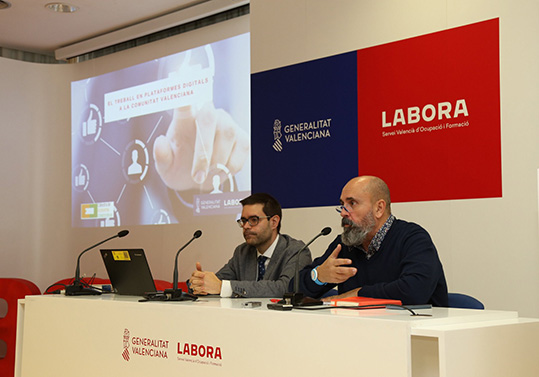A Universitat report calls for legislative reforms for work on digital platforms
- Press Office
- December 5th, 2019

A report of the Universitat de València about “El treball en plataformes digitals en la Comunitat Valenciana” (The Digital Platform Work in the Valencian Community) points out that the most people working on digital platforms are young and 1 in 3 is overqualified. Along with the report, a code of good practice code focused on companies and an informative booklet have been developed so that people working on digital platforms are aware of their rights. These materials, along with the report, will be distributed digitally and physically through the Espai Labora, its website, and LABORA communication networks.
Adrián Todolí, Professor of Labour Law from the Universitat de València, and Enric Nomdedéu, Regional Secretary for Employment, have presented in València this report that approaches the transformation that the platform economy is doing in the employment market and the new legislative challenges that digitisation of work entails.
Digital platforms are economic agents that through a web, app... can take on different roles: buying and selling products, lending or renting goods (cars, houses, parking lots...), providing services (delivery, transport, care, repairs, etc.). Some examples of these kind of companies are: Glovo, Deliveroo, Nemvo, UberEats, Habitissimo, TopAyuda, FreeTour, EntreLetrados, Cabify, Tripadvisor, Taski or Civitatis.
Digital economy, also known as platform economy or collaborative economy, is not only a change of technological paradigm but also implies a new way of organising work. In Spain, more than 11.6% of the population has received income from digital platforms. Spain is also the second in Europe, after the United Kingdom, in which more people use these services.
“The work carried out through digital platforms modifies and undermines the traditional conception that we had until now of what a job was and the livelihood, rights and obligations linked to them”, has exposed the Regional Secretary for Employment, Enric Nomdedéu.
For this reason, the Valencian Employment and Training Service, LABORA, has collaborated with the Chair for Collaborative Economy and Digital Transformation of the Universitat de València in the preparation of this report.
Working on digital platforms not only affects unqualified people, but also specialised professions such as Law, Architecture, Computer Sciences... are also struck by this. Most of digital platform workers are young: 70% are under 45. In addition, one in three workers has more training than is required for the tasks they perform, so they are overqualified.
“The stereotype that people working for digital platforms are untrained people performing unskilled tasks must be broken. The reality is much more tricky, Glovo and Deliveroo are just the tip of the iceberg", said Adrián Todolí, Professor and co-Director of the UV Collaborative Economy Chair.
The data in the report reveal that the platforms do not create new productive sectors or new occupations, but are essentially limited to changing the way services are offered on the market and organising the work of pre-existing professions.
Moreover, the platform economy has not necessarily facilitated the integration of new members into the labour market, but has generally transformed the contractual relationships of those already in the labour market. Approximately half of today's digital workers have been paid stuff in their previous jobs and a high percentage continue to seek other employment.
Legislative proposals
The report prepared by the UV Collaborative Economy Chair addresses the legal problems arising from the activity of the new forms of digital economy. “Technology cannot be a reason for breaking the law. It is possible that technology demands a normative change, but this cannot be decided by a company, it requires social and political debate,” said Adrián Todolí.
This study rejects a change in legislation that considers platform workers as self-employed. Subcategories of freelancers such as the proposal to create digital TRADES are also rejected. In Todolí’s opinion, “a hypothetical 'TRADE Digital' law would only lead to a conflict between Spanish and international regulations, increasing judicialisation”.
In contrast, Todolí advocates for “regularising the incorrect use by some digital platforms of the figure of the self-employed worker and recognising the occupational nature of workers where the law indicates”.
For this reason, the report proposes that regulations reduce the differences in Tax and Social Security between self-employed workers and those in the employment market by improving the self-employed protection, as these differences may encourage the use of the 'false self-employed’ figure and the loss of the rights of workers classified as self-employed.
“It is necessary to focus on this issue because some companies are abusing the figure of the self-employed, as we are seeing in several trials,"” recalled Professor Todolí.
Thus, the study on platforms proposes a regulation that declares workers who provide services offline through digital platforms as workers and that gives them full rights to choose their timetables and working days. “This would reduce their precariousness and make it easier for them to access collective bargaining and have greater legal security,” said the co-Director of the Chair for Collaborative Economy.
One of the main problems faced by people working on platforms is false flexibility. “If they need the money, they can't turn down jobs. And they must always be available for when request appears,” said Adrián Todolí.
















